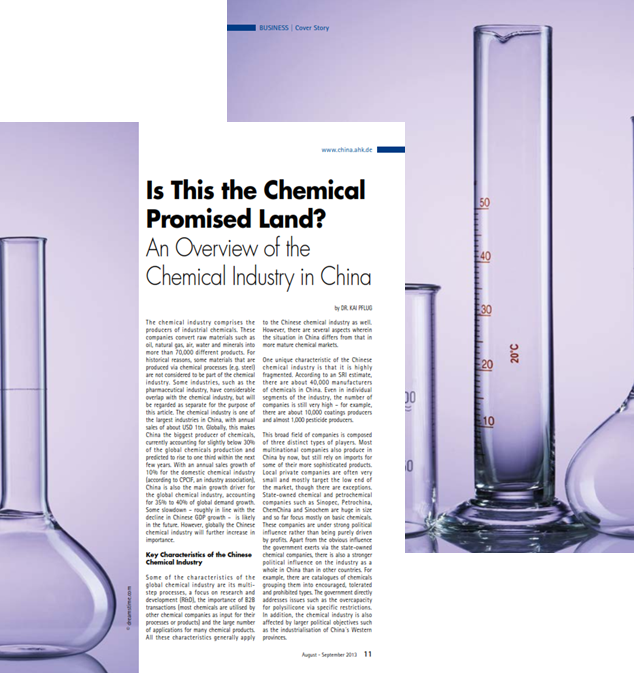We specialize exclusively in the chemical industry in China, providing
- Strategy Development
- Market Information
- M&A Target Search
- Trainings/Workshops
- R&D Optimization
Our clients profit from our in-depth knowledge.
For more information contact Dr. Pflug:
Management Consulting – Chemicals Ltd.
M: Dr. Pflug +86 136 8187 3992
Email: kai.pflug@mc-chemicals.com

Discussion
A note on the items below: it seems this discussion feature never really got going. So if you want to contribute to one of the topics below, or start a discussion on another topic related to the chemical industry in China, please joint the LinkedIn group "News and Trends in China´s Chemical Industry".
The items below will be left online for some time.
Coal Chemicals: The future of China´s chemical industry, or the wrong approach?
"There are limits to the extent coal chemicals can benefit China. Key limitations are both environmental considerations and the comparably limited coal resources China has compared to other regions in the world" (Kai Pflug, MCC)
"The 'back to the future' move by China to coal based chemistry has the potential to revolutionise certain chemical sectors, not only in China, but globally. ...
The significant risk to the Chinese coal based chemical industry is water supply. Coal to chemical processes are much more water intensive than traditional chemical technologies such as naphtha cracking. Water supply is a growing issue around the world including China and it is possible that policy makers may in the future restrict coal chemical operations to preserve water supply for agriculture, hydro-electric and other uses. Having said that, it currently does not appear to be an issue with policy makers recently announcing that the development of the coal chemical industry is an important pillar of future economic policy, which is reinforced by the large number of coal to olefins projects currently being developed, combined with the delay of some Chinese naphtha cracking projects." (Paul Cherry, Consultant at Officium Projects and Trainer at ICIS). Paul gives a much more detailed opinion, please read here.
Then again, other sources state that water is not such an issue - see here.
Government influence: Does it help or hurt chemical state-owned enterprises in China?
"Managers of foreign chemical companies in China often overlook the fact that SOEs do not only get preferential treatment in some areas, they also are severely restricted in their range of actions. Many SOEs still have too many workers, loss-making plants etc., and frequently there is strong political pressure on them not to change this" (Kai Pflug, MCC)
Overcapacity: Why do many Chinese chemical companies react to overcapacities by further adding capacity?
"This question really puzzles me. Is it just that they think they can lower their production costs via economies of scale?" (Kai Pflug, MCC)
"I am interested in your opinion on this. Is it a way of depressing the market price, in a strategy to push laggard producers out of the market resulting in rationalisation in other parts of the world? Building plants at the wrong time? These are very intelligent people driving these companies so this is something I question as well." (An Industry Participant)
"I'm not sure that this is always true, indeed the urethane industry seems to be going through a consolidation phase? Hoever, I seem to remember the yellow phosphorous industry has changed considerably since the Chinese played their game and disposed of almost the whole industry outside of China? I also think that some western countries are not much better, especially as far as capacity in China/Asia is concerned (Take Lanxess and Iron Oxide or Butyl over the last two years. Reliance in India might be another example) The chemicals from oil industry is noted for its cyclical nature which generally involves everyone investing at the same time which leads to overcapacity, which in turn has to become utilized until anyone earns enough to start reinvestment - which again everyone does at the same time. In a world where the Level of communication between competitors is restricted by monopoly laws this seems to be inevitable. Good ideas usually come to more than one person at once!" (Stephen Pask)
Strategy: Do Chinese chemical companies need clearer strategies?
"The greatest weakness of Chinese chemical companies´strategies is their almost exclusive focus on market opportunities - they tend to ignore the aspect of internal capabilities. Thus every company ends up doing the same, often without really having the right capabilities and resources" (Kai Pflug, MCC)
Challenges: What are the biggest challenges to the chemical industry in China?
"The major challenges seem to be overcapacity, low technology level, lower market growth due to slower economic growth, tightening environmental regulation, industry fragmentation" (Kai Pflug, MCC)
